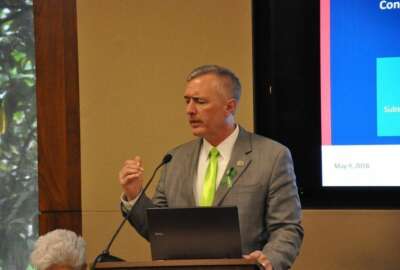
House bill would create panel of cyber experts to help DHS
In today's Federal Newscast, bipartisan legislation in the House would create a panel of cyber professionals to advise the Department of Homeland Security.
To listen to the Federal Newscast on your phone or mobile device, subscribe on PodcastOne or Apple Podcasts. The best listening experience on desktop can be found using Chrome, Firefox or Safari.
- Bipartisan legislation in the house would create a panel of cyber professionals to advise the Department of Homeland Security. The bill would create a 35 member panel within DHS’ Cybersecurity and Infrastructure Security agency, to help craft policies and new programs. One of the bill’s sponsors John Katko (R-N.Y.), also ranking member on the Cybersecurity, Infrastructure Protection & Innovation subcommittee, said the panel — to be named the Cybersecurity Advisory Committee — will help facilitate a vital dialogue between the public and private sector. (Rep. John Katko)
- It may take agencies some time to fully implement the 1.9 percent pay raise for some federal employees in specific situations. The Office of Personnel Management has more guidance out about the 2019 retroactive pay raise. Agencies should adjust employee deductions, government contributions, and lump leave banks for federal workers who retired, separated or transferred agencies between Jan. 6 and now, to account for the new pay raise. The retroactive pay raise will also apply to premium pay. (Federal News Network)
- A bill that would grant Transportation Security Administration officers Title 5 rights now has a Senate companion. Sen. Brian Schatz’s (D-Hawaii) bill would give TSA officers the same due process rights as most other federal employees. It would also place TSA officers on the General Schedule pay scale and would give federal employee unions more collective bargaining power with TSA than they have now. Chairwomen of the Homeland Security and Appropriations Committee, Rep. Nita Lowey (D-N.Y.), introduced the House version. (American Federation of Government Employees)
- Five approaches have emerged to modernize the skills of the federal workforce. One idea would create an online gaming platform to let federal employees test their skills and interests and then train them for new jobs. Another would integrate multiple services, advanced technologies and create a personalized career compass to provide feds with a data-driven job market recommendations and continuous learning strategies. These are just two of the five ideas submitted by academics from different universities, which reached the second round of the National Science Foundation’s Career Compass Challenge. Each team won $5,000 to develop a working prototype to compete to win as much as $75,000 in round two. (Challenge.gov)
- One new federal official was sworn in and another nominated for agency leadership positions. Donald Washington took his seat as director of the U.S. Marshals Service. Washington was a U.S. Attorney for Western Louisiana, having served in the George W. Bush administration. He was also chairman of the Southeastern United States organized crime drug enforcement task force. President Donald Trump also nominated Scott Soles, a Houston consultant and financial auditor, to become chief financial officer of the Agriculture Department. (Department of Justice) (U.S. Department of Agriculture)
- The IRS may be required to follow the suggestions of its main critic. Reps. Darin LaHood (R-Ill.) and Tom Suozzi (D-N.Y.), both members of the House Ways and Means Committee, introduced a bill to make the IRS more responsive to recommendations made by the National Taxpayer Advocate. The bill would require the agency to answer taxpayer assistance directives issued by the organization within 90 days. The bill would also require the taxpayer advocate to report to Congress if directives don’t get a response from the IRS within that time frame. (Rep. Darin LaHood)
- Defense contractors could start having their cybersecurity standards scrutinized within the next 18 months. Ellen Lord, DoD undersecretary for acquisition and sustainability, said the Pentagon will hire third-party auditors to enforce cybersecurity standards set by the National Institute of Standards and Technology and DoD. The Pentagon also plans to build upon the NIST standards later this year to further secure Defense networks. (Federal News Network)
- New proposed and final rules from the Defense Department would make several changes to defense acquisition regulations. One in particular will implement a section of the 2017 Defense Authorization bill, which mandated a preference for fixed-price contracts, and requires a review of certain cost-reimbursement contract types. (Federal Register)
- Women are leaving the Coast Guard because of concerns about sexual harassment, perceived gender bias and a scarcity of female role models, a new RAND Corporation study said. The Coast Guard commissioned the study after it realized it was losing many of its mid-career women. It has a retention rate of about 95 percent. The Coast Guard created a Personnel Readiness Task Force aimed at exploring forward-leaning policies to retain women and minorities. (RAND Corporation)
- The Air Force fired two squadron commanders after an investigation into widespread hazing within their units. The branch relieved the commanders of the 3rd and 5th Air Support Operations Squadrons for allowing a practice called “rolling up.” Airmen were allegedly tackled and tied up with duct tape, a practice that was reportedly “common and widespread” in the squadrons in Alaska and Washington State. The wing commander overseeing the units said the actions crossed clear lines between maintaining tradition and undermining mission effectiveness. (Federal News Network)
Copyright © 2024 Federal News Network. All rights reserved. This website is not intended for users located within the European Economic Area.
Eric White
Eric White is news anchor and Federal Drive producer at Federal News Network.
Follow @FEDERALNEWSCAST
Related Stories
Related Topics
2017 NDAA
Agriculture Department
All News
American Federation of Government Employees
Brian Schatz
Career Compass Challenge
Challenge.gov
Coast Guard
Cybersecurity Advisory Committee
Cybersecurity and Infrastructure Security Agency
Darin LaHood
defense contractors
Defense Department
Department of Homeland Security
Donald Washington
Ellen Lord
Federal Drive
Federal Newscast
federal pay raise
IRS
John Katko
National Institute of Standards and Technology
National Science Foundation
National Taxpayer Advocate
Personnel Readiness Task Force
RAND Corporation
retroactive pay
Scott Soles
Transportation Security Administration
Trump administration





